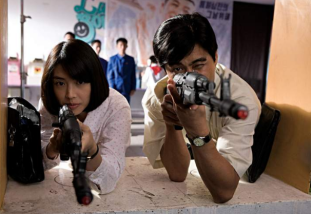
Last weekend the world was baffled by the statement of the (North) Korean Central News Agency (KCNA) which explained why Alek Sigley, the Australian student who had studied at the Kim Il-sung University in Pyongyang, was detained, investigated and expelled. Nobody, including seasoned North Korea watchers, could make sense of this brief but eloquent statement that became viral among Western media even before it appeared on the KCNA official site.
The statement lambasted Mr Sigley for secretly conducting “anti-government propaganda via the Internet”. It said he was caught “red-handed committing anti-DPRK incitement through Internet” and questioned by the “relevant institution” on June 25. Investigation revealed that at the instigation of various ostensibly anti-DPRK media organisations Alek “several times handed over the data and photos he collected and analysed while combing Pyongyang”. He was able to explore the city because he held an identity card that labelled him as a foreign student”. The newsagency said that Mr Sigley “honestly admitted his spying acts”, “repeatedly asked for a pardon”, and apologised “for encroachment upon the sovereignty of the DPRK”. The DPRK government expelled him from the country on July 4, “by showing humanitarian leniency”.
It is true that, while studying in North Korea, Alek was a prolific user of various social media platforms and new means of communication. In 2019, he penned and published his writing on-line, describing the local restaurants, male and female fashion, mobile apps and popular hobbies. Perhaps, this was a marketing strategy to attract more attention to his business project, Tongil Tours, which he was running in addition to his work on the Master Thesis in Literature tentatively entitled “Love the North Korean Style”.
This would be innovative and interesting contribution to the North Korea Studies because no western scholar has systematically analysed how Love is understood in the most secluded and militaristic society on Earth. Alek must have been combing the streets and alleys of Pyongyang (which is romantically nicknamed in Korean a “willow capital”) in search of dating couples and happy families. In North Korea, marriage is permitted only if sanctioned by the state. To achieve that, every young man must serve 10 years in the military and every young woman must reach “revolutionary maturity” through studies or work. Until then Love can be expressed only towards their comrades, community or nation.
Creative research like this cannot be done is isolation and requires discussion and feedback. The use of the Internet in North Korea is permitted only to foreign visitors and residents, including international students, diplomats, accredited journalists and NGO staff. All of them have different visa types, which should not be confused. International students in North Korea are not supposed to report or exchange pictures and videos with foreign media outlets. In a country where every piece of foreign printed material must be meticulously declared at customs, uncensored access to the Internet poses a serious risk to national security. That is why ordinary North Koreans have no access to the World Wide Web or the telephone lines that can receive or make calls outside of the country. They use the Intranet and closed telephone and mobile networks monitored by the government.
Alek had the privilege of benefiting from the wonders of the 21st century while living in a country deeply stuck in the Cold War ideological conflict. DPRK national security law is fierce and intolerant to anyone who might breach it on purpose or accidentally. The grey area created by the usage of social media was bound to attract the attention of the almighty Ministry of State Security to Alek and his research. The two questions to consider here are “why did it happen now?” and “how is it that the Ministry of Foreign Affairs, which was so fond of Alek and his work, could not even answer the question about his whereabouts?”
Perhaps the most plausible answer is that DPRK is not a monolith with single-hearted unity that speaks with one voice. There are many factions inside with very different views, and even if you are loved and in good graces of some parts of the DPRK government, the State Security apparatus is a coequal branch of government that rarely agrees with outward-looking people. The stability of the DPRK comes from this inertia that prevents any real change from happening. This also makes it very dangerous for naive foreigners who don’t get that there is no one-man rule or consolidated unity in what the government says, does, or thinks. One of the biggest misconceptions is that Kim Jong-un is the omnipotent autocrat who gets whatever he wants. The truth is much more complex: North Korea has its own “deep state”, just like any other nation.
For those who still believes that North Korea’s human rights record is problematic, they did not forget to remind us that Alek Sigley‘s release was an act of “humanitarian leniency”. People in the government wanted to show us that they have read Michael Kirby’s Report on Human Rights in North Korea and learnt their lesson.
Finally, we should not underestimate the Koreans’ penchant for symbolism in dates and numbers. Whatever was the reason for this strange security operation, Alek Sigley was arrested on the 25th June, the date when the Korean War started, and was liberated on the 4th July, when Americans were preparing to celebrate their national day. Perhaps, someone in the government wanted to do it in solidarity with the American people’s successful struggle against monarchy and colonialism.
—
Excerpts from this piece were used by the Sydney Morning Herald and The West Australian newspapers.
—
 (
(
You must be logged in to post a comment.